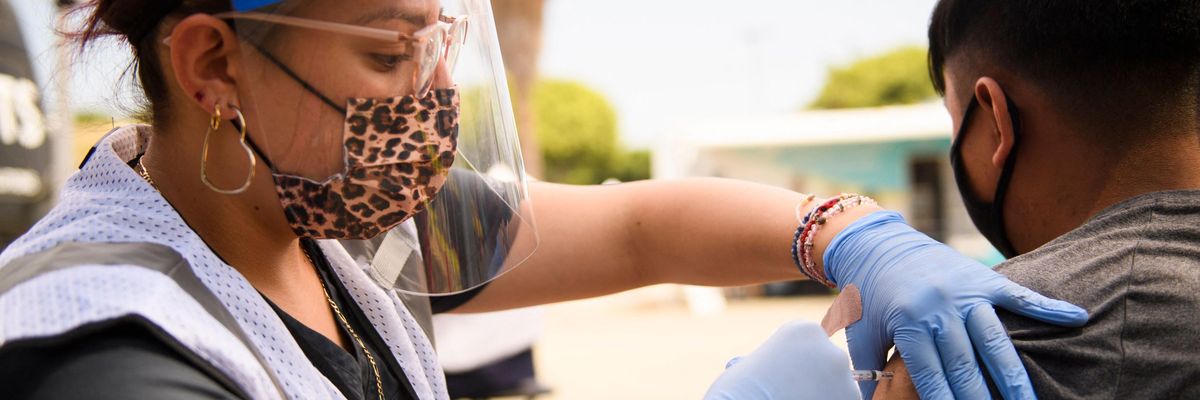This week's high-stakes
negotiations on a new global treaty inspired by the Covid-19 crisis "present an historic opportunity to prepare for future pandemics, to protect lives and livelihoods, and to demonstrate political leadership the world will long remember," a dozen progressive U.S. lawmakers wrote to President Joe Biden on Tuesday.
The members of Congress told Biden that "as the U.S. participates in the negotiation of the pandemic accord at the World Health Organization (WHO), we urge you to push for strong, binding equitable access standards to ensure that tests, treatments, and vaccines for the next global public health threat are available to everyone who needs them as soon as possible."
"You can help make sure the next pandemic is shorter and less deadly than the last."
"Nearly 15 million people died during the first two years of the pandemic," they noted. "Most tragically, millions of people died needlessly after the vaccines were developed, but before they became widely available in low-and-middle income countries. Major manufacturers chose not to share the vaccine recipe to expand global production."
"But vaccine inequity did not just hurt people abroad. Major gaps in access to vaccines globally also increased the risk of deadly new variants that changed the course of the pandemic at home," the lawmakers highlighted, stressing that "we must act on the lessons learned from the Covid-19 pandemic."
The letter was led by Sens. Bernie Sanders (I-Vt.) along with Reps. Lloyd Doggett (D-Texas) and Jan Schakowsky (D-Ill.). They were joined by Sens. Jeff Merkley (D-Ore.), Elizabeth Warren (D-Mass.), and Peter Welch (D-Vt.), as well as Reps. Sara Jacobs (D-Calif.), Ro Khanna (D-Calif.), Barbara Lee (D-Calif.), Ilhan Omar (D-Minn.), Cori Bush (D-Mo.), and Mark Pocan (D-Wis.).
During the WHO talks on pandemic prevention, preparedness, and response—which
began Monday and are scheduled to run through March 28—they want the Biden administration to champion three foundational commitments:
- Pharmaceutical companies should not be allowed to charge outrageous prices for products developed with taxpayer dollars;
- When the public funds information that can help end a pandemic, it should not be kept a secret; and
- The U.S. should support countries that take steps to increase access to pandemic products.
The letter specifically calls out Pfizer and Moderna, asserting that the latter "serves as a powerful reminder for why American leadership is so critical," because the Massachusetts-based company "worked hand-in-hand with scientists at the U.S. National Institutes of Health" to invent one of the multiple coronavirus vaccines created during the pandemic.
"U.S. taxpayers spent $12 billion to research, develop, and procure the vaccine," the letter explains. "Yet Moderna refused to share its technology with other manufacturers to increase global production, charged some poorer countries more for doses than wealthy countries, and then quadrupled the price of the Covid vaccine to $128—at a time when it costs just $2.85 to manufacture the vaccine."
"A fairer, more equitable response to the next public health outbreak is in everyone's interest," the lawmakers wrote to Biden. "By supporting strong, binding equitable access standards, you can help make sure the next pandemic is shorter and less deadly than the last."
Reporting on the negotiations Monday, Axiospointed out that "a key sticking point is whether countries must provide viral specimens or genome sequences to a global repository managed by the World Health Organization, which would enable others to use that information to create vaccines, diagnostic tests, and treatments."
Nithin Ramakrishnan of the global advocacy group Third World Network told the outlet that the treaty's current draft "serves the interests of developed countries and their biotech industries by forcing developing countries to share biological materials and information without adequate legal certainty of benefit sharing."
